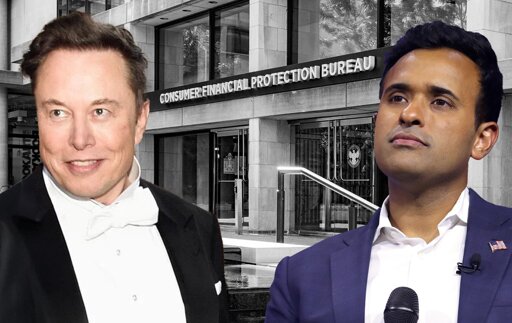Summary
Billionaires like Marc Andreessen, Elon Musk, and Vivek Ramaswamy are spreading false claims to discredit the Consumer Financial Protection Bureau (CFPB), a federal agency protecting consumers from fraud and abuse.
Andreessen falsely accused the CFPB of politically motivated “debanking,” despite no evidence.
This rhetoric aligns with the “DOGE” project, led by Musk and Ramaswamy, which aims to slash government regulations and programs under the guise of efficiency.
Critics warn this effort will harm public services, benefit billionaires, and push privatization at the expense of ordinary Americans.



I’m not from the US, so I don’t care about your founders.
History books, and biology as well mind you, actually say that the actions of a group of individuals working together have more power than those of individuals working alone, and in any coordinated effort there is a subsection of the group that takes care of the whole and marks the pace. Throughout history the civilizations that managed to thrive and leave their mark were those whose governing body was efficient and effective, and there’s no denying that. You may be able to wrangle your friends and coordinate them without a specific administrative role, but try doing that with a group of people surpassing the hundreds of millions and you will have a problem.
In this instance, US history is more relevant than your opinions.
For some reason it doesn’t surprise me that you don’t believe in history beyond 1776
Most of the history that comes to mind predates 1776, which makes sense.
Stopping your historical studies before things like the end of chattel slavery and the start of the industrial revolution seems like a bad idea. You might have missed one or two significant events.
I’m sorry I think you’re replying to the wrong person as I didn’t say anything about stopping but hey, go gettem tiger.
You said this:
So sure, you didn’t literally use the word stop. You just decided any history post-the third quarter of the eighteenth century was moot. My mistake.
What I said is straight forward and true and doesn’t say anything about stopping or history being moot, that’s all your baggage.
We have a lot of history about governments spanning many thousands of years so naturally when you are thinking about governments from a historical perspective, most will predate 1776. It doesn’t mean I am not thinking about what has transpired since but you know its been hundreds of years, and not thousands. Kind of a no-brainer my dude.
See, the issue here is that you are so ignorant of history that you think 1776 is some important date for governments due to the association with the American Declaration of Independence, rather than the U.S. Constitution that wasn’t written until over 20 years later.
So essentially what you are saying is that the only history of governments that is worth studying is the history of absolute monarchy, feudalism and the Althing in Iceland… but only those things up to 1776.
Ooooh nice, an enlightened Libertarian, and one that thinks that Americans are special, unique little snowflakes, different from the rest and immune to the rules that have historically governed the entirety of humanity for millennia
The article is about the US.
And this thread is about governments in general, and their necessity in enforcing these social contracts you’re referring to.
Wrong. You’re responding to me who is commenting on OP’s article.
You understand that there’s more than one person involved in an Internet comment thread right
Sure.
https://www.allsides.com/news-source/current-affairs-media-bias https://en.wikipedia.org/wiki/Echo_chamber_(media)#%3A~%3Atext=An+epistemic+bubble+is+an%2Cof+significant+information+and+reasoning.
In an extreme “echo chamber”, one purveyor of information will make a claim, which many like-minded people then repeat, overhear, and repeat again (often in an exaggerated or otherwise distorted form) until most people assume that some extreme variation of the story is true.
Care to explain what the fuck that has to do with anything?